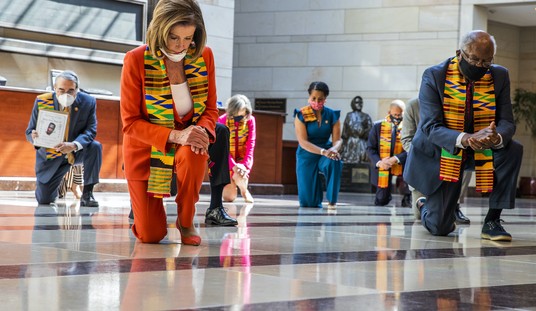If anyone has a case for buyer’s remorse, it’s the Palestinians in Gaza. They elected Hamas to power after the Israeli withdrawal from the territory in a rebuke to Fatah’s corruption, and have suffered for it ever since. The corruption simply changed hands, and worse yet was Hamas’ attempts to militarize Gaza. That forced both Israel and Egypt to close the borders and enforce an embargo (which, contrary to common perception, happened after Hamas’ election and not before). Hamas regularly uses residential areas as cover for their rocket fire, which makes their homes and schools targets for Israeli retaliation, not to mention the tunnel entrances that Hamas created under their feet. In this latest edition of the Gaza war, more than 1900 Palestinians have died, and many more rendered homeless by the destruction created by Hamas’ war of choice.
Have they had enough of Hamas? That’s a complicated question, but the Washington Post’s Sudarsan Raghavan reports that opposition may be the result of this latest war — and especially the refusal to accept the cease-fire proposal at the beginning of it:
As the Palestinian death toll tops 1,900, more and more Gazans are questioning the decisions and strategies of Hamas, the militant Islamist group that tightly controls the Gaza Strip and is known to intimidate — and sometimes harm — those critical of its policies. Most of the disapproval is still beneath the surface, hinted at only in private conversations. But inbattered enclaves such as Beit Lahiya, discontent is bubbling up openly, fueled by a sense of helplessness and fatigue.
The criticism does not necessarily reflect a loss of support for Hamas. Most Palestinians, even Hamas’s biggest detractors, say they back the current war against Israel, believing it is the only way to achieve the short-term Palestinian demands of lifting the Israeli and Egyptian economic blockades of Gaza and opening the strip’s border crossings. No Beit Lahiya residents accuse Hamas of using them as human shields, as Israel claims, even as they acknowledge that militants are firing rockets from their neighborhoods.
Perhaps they don’t accuse Hamas of using them as human shields for the same reason many of them won’t speak out against Hamas openly. Hamas isn’t exactly a model of political tolerance, after all. The ruling group confirmed last week that it had executed so-called “collaborators,” after multiple reports that protestors against Hamas had been murdered for their activism. Hamas has also executed dozens of tunnel workers in an effort to keep intelligence on their underground systems from reaching the IDF.
That may explain why Gazans don’t speak publicly about their unhappiness with Hamas, or their plight as human shields. Neither can really be denied, however. Video from news organizations have shown Hamas setting up rocket launchers next to hotels and residential structures, inviting retaliation from the IDF that ends up killing civilians and displacing many others. That’s why Gaza looks like this now:
Even with the denials, which Raghavan repeats for emphasis at the end of the article, it’s clear that Gazans want a change for some reason. And that reason is because they’ve concluded that being human shields is not any way to live life:
Now, some Palestinians are questioning the decision to reject the first truce. Roughly 200 Palestinians had been killed in the fighting at that time. Today, amid another Egyptian-led truce effort, the death toll is nearly 10 times greater, and Gaza is a wasteland of destruction that exceeds that left behind after the previous two Israel-Hamas conflicts, in 2009 and 2012.
“All the people are whispering, ‘Why didn’t Hamas accept the Egyptian initiative in the beginning of the war when the casualties were still low?’ ” said Hani Habib, a Palestinian journalist and political analyst.
Those sentiments can be heard around Beit Lahiya, a sprawling, hilly enclave of large houses abutting the border with Israel. Many residents said they were exhausted from bearing the brunt of the war, noting that the fighting had done much less damage to Israel.
“They should have accepted the cease-fire,” said Hathem Mena, 55, a teacher, referring to Hamas and other Palestinian militants. “It would have stopped the bloodshed. We are the ones affected by the war, our houses and our lives. The destruction is over on this side, not the Israeli side.”
The reason for that is Israel builds systems to protect its civilians from Hamas’ attacks. Hamas builds its systems in residential areas to use civilians to protect Hamas from Israel’s attacks. As long as that happens, the damage from Hamas’ wars will always be in the Gazans’ own homes, and Hamas will continue to make war with Israel as long as Gazans leave them in power.
Meanwhile, the Egyptians believe they have a formula for a more permanent cease-fire that will attract both sides, but time is running out:
Mediators have proposed that talks on key Palestinian demands of a seaport and an airport in Gaza be delayed until a month after a permanent ceasefire takes effect, according to the Egyptian proposal contained in documents seen by AFP on Wednesday.
Negotiations on proposals for the handover of the bodies of two slain Israeli soldiers held by Palestinian militants in exchange for the release of prisoners in Israeli jails would also be postponed, according to the document.
Under the proposal, the buffer zone along Gaza’s border with Israel would be gradually reduced and guarded by Palestinian Authority president Mahmud Abbas’s security teams.
The negotiations “are in a very sensitive stage and we hope to reach an agreement” before midnight (2100 GMT), said Palestinian delegation head Azzam al-Ahmed.
Hamas is understood to be demanding clear commitments to opening the ports in Gaza, even if they are to be established at a later date.
The Palestinians, included Hamas, are also demanding an end to the eight-year blockade of Gaza.
The blockade will be the sticking point. There is no way that Israel will relax the blockade and allow Hamas to rearm significantly. Egypt purposefully has remained vague on that point, but proposes that the blockade be part of later negotiations — but not with Hamas. Instead, the Palestinian Authority would conduct those negotiations, which might mean that Gazans who suffer under Hamas might think twice about their choice of leadership seven years ago.
The cease-fire expires at midnight local time (5 pm ET), and Israel says it’s prepared for the worst:
Israel warned Palestinian militant groups in the Gaza Strip they face a harsh response if rocket fire from the Hamas-ruled area resumes, as the midnight expiry of a three-day truce drew near without word of an extension.
“Israeli forces are ready for any development,” Israeli Minister of Intelligence and Strategic Affairs Yuval Steinitz told reporters in Jerusalem today. “Quiet will be answered by quiet on our side, but if Hamas will resume the bombardment of Israeli citizens and towns, their rocket and mortar bombardments, our counterstrike will be very strong.”
Israeli and Hamas leaders have sounded pessimistic about turning the 72-hour pause in hostilities into a more permanent truce after four weeks of violence that killed more than 1,900 Palestinians and 67 people on the Israeli side. Hamas said this would be its last cease-fire effort.
If they restart the Gaza war, it might be their last turn at being in charge. Gazan grumbling is getting out into the open, which considering Hamas’ bloody imposition of power, demonstrates just how unpopular their war and their leadership has become.








Join the conversation as a VIP Member